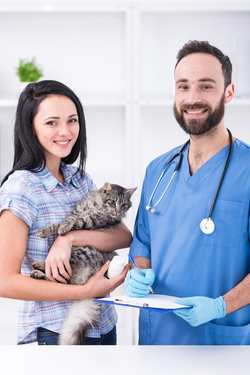Info for Clients: Cats, Medications, and Toxicity

While many drugs and medications are safe for both human and dog use, the same does not apply to cats. Unless specifically indicated, cats should never be given people or dog medications or supplements. Give your clients this information to ensure their cats stay safe:
Why Clients Should Never Medicate Their Cats
Cats Are Especially Sensitive to Drugs and Medications
A cat’s sensitivity to drugs and medications occurs due to a deficiency in a liver enzyme that aids in the metabolism of many drugs and medications. The enzyme deficiency diminishes their ability to not only effectively break down the drug or medication for use, but also to eliminate it from their body.
The Margins Between Underdosing and Toxicity Are Small
Most human drugs or medications are dosed according to the human patient’s weight, which increases the importance of knowing the exact weight of the cat. Remind your clients there is a small margin of safety when determining the correct drug or medication dosage for a cat.
- If weight is estimated, it can lead to either under- or over-dosing the animal
- A therapeutic dose is cat-specific and will supply the veterinarian-diagnosed needs of the animal
- A toxic dose is one that produces toxic drug levels in the animal’s body by either:
- An overdose, or
- The animal’s inability to eliminate the drug or medication from its body.
Remind your clients that symptoms of toxicity may include vomiting, seizures, lethargy, lack of appetite, and coma.
Many Factors Determine The Correct Dosage
In order to determine the drug dosage required to appropriately treat a cat, you also must take into consideration other animal-specific information, for example:
- Age
- Drug toxicity is more common in kittens and very old cats
- Older cats may be more susceptible to organ failure related to an inability to break down and excrete the drug
- Even when dosage is based upon weight, kittens may require a lower dose due to immature kidneys
- Health of the animal
- Animals with health problems such as advanced liver or kidney disease may have increased difficulty with drug excretion, which could lead to organ failure
- Needs of the animal
- Drug toxicity can also occur in animals that are given the drug for too long a length of time.
Cats Hide Signs of Drug Toxicity
Cats are known for hiding their ailments, which makes signs of drug toxicity difficult to recognize. By the time the problem is identified, permanent damage may have already occurred. Drug toxicity is known to affect a cat in the following ways:
- Hearing
- Toxicity may create nerve damage which may result in permanent hearing loss or deafness
- Liver
- Damage may first be noted by jaundice, but can lead to liver failure
- Kidneys
- Damage from toxicity will cause:
- Nitrogen retention
- Uremia
- Kidney failure
- Bone marrow
- Drug toxicity can create irreversible effects to the production of red blood cells, white blood cells, and platelets
- Gastrointestinal system
- Damage may be observed through:
- Nausea
- Vomiting
- Diarrhea
- Loss of appetite
- Nervous system
- Neurological problems will arise, to include symptoms of:
- Disorientation
- Ataxia
- Coma.
Tell Your Clients Why They Should Never Medicate Their Own Cats
While some human medicines are used to treat cats, the safety of their use depends on the animal, its age, and its health status. It is imperative that cat owners understand the importance of talking with their veterinarian about the health and treatment needs of their pet.
Contact your Covetrus representative for additional information on cat treatment needs at: 855.724.3461.
Careers
Are you looking for a place to let your talents shine? At Covetrus, we help our practitioner customers better serve their patients and take pride in providing the best customer experience possible. Search our open positions to see our available opportunities.
Newsletter
Stay current with what’s going on with Covetrus, subscribe to receive our newsletter and email communications. Subscribers will receive the latest information in practice management, sales and marketing, animal health, and more.


Leave a comment